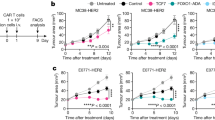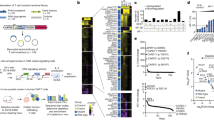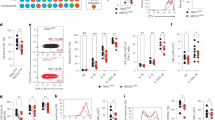Abstract
The antiapoptotic BCL-2 protein MCL-1, which opposes mitochondrial outer membrane permeabilization, was shown to have a crucial role in the survival of hematopoietic cells. We have previously shown that, upon loss of phosphatidylinositol 3-kinase signaling, S159 of MCL-1 is phosphorylated by glycogen synthase kinase-3 (GSK-3), earmarking MCL-1 for enhanced ubiquitylation and degradation. In this study, we introduced MCL-1wt or the phosphorylation-deficient mutant MCL-1S159A in mouse BM cells, followed by adoptive transfer to recipient mice. Mice expressing MCL-1S159A exhibited significantly elevated white blood cell and lymphocyte counts, whereas no effect was observed on the distribution of T and B lymphocyte subsets or the numbers of monocytes, red blood cells or platelets. Expression of MCL-1S159A in Eμ-Myc transgenic bone marrow significantly accelerated the onset of disease, and these mice displayed increased spleen weights compared with Eμ-Myc/MCL-1wt mice. Our data demonstrate that the absence of MCL-1 S159 phosphorylation provides a survival advantage for hematopoietic cells in vivo and facilitates oncogenesis.
This is a preview of subscription content, access via your institution
Access options
Subscribe to this journal
Receive 50 print issues and online access
$259.00 per year
only $5.18 per issue
Buy this article
- Purchase on Springer Link
- Instant access to full article PDF
Prices may be subject to local taxes which are calculated during checkout


Similar content being viewed by others
References
Dzhagalov I St, John A, He YW . The antiapoptotic protein Mcl-1 is essential for the survival of neutrophils but not macrophages. Blood 2007; 109: 1620–1626.
Opferman JT, Letai A, Beard C, Sorcinelli MD, Ong CC, Korsmeyer SJ . Development and maintenance of B and T lymphocytes requires antiapoptotic MCL-1. Nature 2003; 426: 671–676.
Steimer DA, Boyd K, Takeuchi O, Fisher JK, Zambetti GP, Opferman JT . Selective roles for antiapoptotic MCL-1 during granulocyte development and macrophage effector function. Blood 2009; 113: 2805–2815.
Opferman JT, Iwasaki H, Ong CC, Suh H, Mizuno S, Akashi K et al. Obligate role of anti-apoptotic MCL-1 in the survival of hematopoietic stem cells. Science 2005; 307: 1101–1104.
Cross DA, Alessi DR, Cohen P, Andjelkovich M, Hemmings BA . Inhibition of glycogen synthase kinase-3 by insulin mediated by protein kinase B. Nature 1995; 378: 785–789.
Maurer U, Charvet C, Wagman AS, Dejardin E, Green DR . Glycogen synthase kinase-3 regulates mitochondrial outer membrane permeabilization and apoptosis by destabilization of MCL-1. Mol Cell 2006; 21: 749–760.
Ding Q, He X, Hsu JM, Xia W, Chen CT, Li LY et al. Degradation of Mcl-1 by beta-TrCP mediates glycogen synthase kinase 3-induced tumor suppression and chemosensitization. Mol Cell Biol 2007; 27: 4006–4017.
Morel C, Carlson SM, White FM, Davis RJ . Mcl-1 integrates the opposing actions of signaling pathways that mediate survival and apoptosis. Mol Cell Biol 2009; 29: 3845–3852.
Zhao Y, Altman BJ, Coloff JL, Herman CE, Jacobs SR, Wieman HL et al. Glycogen synthase kinase 3alpha and 3beta mediate a glucose-sensitive antiapoptotic signaling pathway to stabilize Mcl-1. Mol Cell Biol 2007; 27: 4328–4339.
Inuzuka H, Shaik S, Onoyama I, Gao D, Tseng A, Maser RS et al. SCF(FBW7) regulates cellular apoptosis by targeting MCL1 for ubiquitylation and destruction. Nature 2011; 471: 104–109.
Strasser A, Harris AW, Bath ML, Cory S . Novel primitive lymphoid tumours induced in transgenic mice by cooperation between myc and bcl-2. Nature 1990; 348: 331–333.
Brunelle JK, Ryan J, Yecies D, Opferman JT, Letai A . MCL-1-dependent leukemia cells are more sensitive to chemotherapy than BCL-2-dependent counterparts. J Cell Biol 2009; 187: 429–442.
Campbell KJ, Bath ML, Turner ML, Vandenberg CJ, Bouillet P, Metcalf D et al. Elevated Mcl-1 perturbs lymphopoiesis, promotes transformation of hematopoietic stem/progenitor cells, and enhances drug resistance. Blood 2010; 116: 3197–3207.
Shaw RJ, Ras Cantley LC . PI(3)K and mTOR signalling controls tumour cell growth. Nature 2006; 441: 424–430.
Gutierrez A, Sanda T, Grebliunaite R, Carracedo A, Salmena L, Ahn Y et al. High frequency of PTEN, PI3K, and AKT abnormalities in T-cell acute lymphoblastic leukemia. Blood 2009; 114: 647–650.
Sander S, Calado DP, Srinivasan L, Kochert K, Zhang B, Rosolowski M et al. Synergy between PI3K signaling and MYC in Burkitt lymphomagenesis. Cancer Cell 2012; 22: 167–179.
Beroukhim R, Mermel CH, Porter D, Wei G, Raychaudhuri S, Donovan J et al. The landscape of somatic copy-number alteration across human cancers. Nature 2010; 463: 899–905.
Xiang Z, Luo H, Payton JE, Cain J, Ley TJ, Opferman JT et al. Mcl1 haploinsufficiency protects mice from Myc-induced acute myeloid leukemia. J Clin Invest 2010; 120: 2109–2118.
van Delft MF, Wei AH, Mason KD, Vandenberg CJ, Chen L, Czabotar PE et al. The BH3 mimetic ABT-737 targets selective Bcl-2 proteins and efficiently induces apoptosis via Bak/Bax if Mcl-1 is neutralized. Cancer Cell 2006; 10: 389–399.
Harris AW, Pinkert CA, Crawford M, Langdon WY, Brinster RL, Adams JM . The E mu-myc transgenic mouse. A model for high-incidence spontaneous lymphoma and leukemia of early B cells. J Exp Med 1988; 167: 353–371.
Acknowledgements
We thank Martin Brandenburg, Katharina Thumm, Heiko Bauer, Klaus Geiger, Jan Bodinek-Wersing and Karin Neubert. This study was supported by Grants Ma 1967/1 and Ma 1967/2 from the Deutsche Forschungsgemeinschaft to UM, Grants 109199 and 107397 from the Deutsche Krebshilfe to UM the Spemann Graduate School of Biology and Medicine (SGBM, GSC-4) funded by the Excellence Initiative of the German Federal and State Governments, Germany to PBS, FP and UM, by the Centre for Biological Signalling Studies (BIOSS, EXC-294) funded by the Excellence Initiative, Germany to UM and CB and a fellowship from the Dr Heinrich Kircher-Stiftung to SEL as well as the Austrian Science Fund (FWF) to AV.
Author information
Authors and Affiliations
Corresponding author
Ethics declarations
Competing interests
The authors declare no conflict of interest.
Additional information
Supplementary Information accompanies this paper on the Oncogene website
Supplementary information
Rights and permissions
About this article
Cite this article
Lindner, S., Wissler, M., Gründer, A. et al. Increased leukocyte survival and accelerated onset of lymphoma in the absence of MCL-1 S159-phosphorylation. Oncogene 33, 5221–5224 (2014). https://doi.org/10.1038/onc.2013.469
Received:
Revised:
Accepted:
Published:
Issue Date:
DOI: https://doi.org/10.1038/onc.2013.469
Keywords
This article is cited by
-
Requirement of GSK-3 for PUMA induction upon loss of pro-survival PI3K signaling
Cell Death & Disease (2018)
-
IL-4 enhances survival of in vitro-differentiated mouse basophils through transcription-independent signaling downstream of PI3K
Cell Death & Disease (2018)



